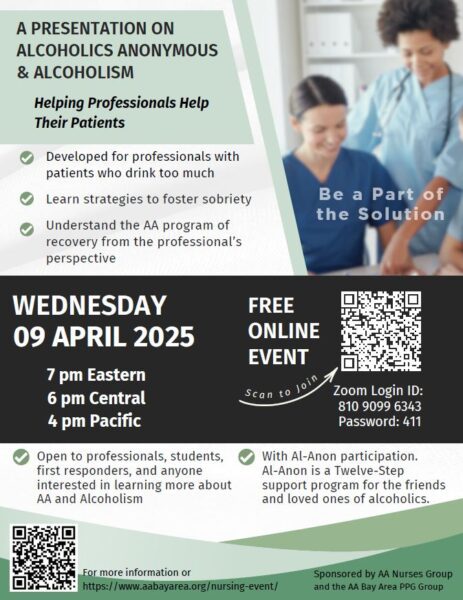
Healthcare Professionals & Alcoholics Anonymous
Carrying the message of recovery to those who are on the front lines dealing with the still suffering alcoholic.
PARTNERS
Join Our Live Event
PARTNERS
Join Our Live Event
Presentation of AA & Al-Anon
Q&A with Nurses and Healthcare Professionals in Recovery
Alcoholics Anonymous
The original Twelve-Step recovery program for alcoholism. Anyone is welcome at an open AA meeting. There are no fees or dues. AA meetings are free to attend.
Member’s voluntary service and financial contributions support the individual AA Group and Organization.
The only requirement for membership in AA is a desire to solve the drinking problem.
Cooperation
The AA organization and individual groups will cooperate with anyone to help alcoholics, they do not affiliate themselves with any outside entities.
Creating relationships with members of the community is a priority for AA members. The AA organization has several established committees tasked with reaching out to hospitals, institutions, treatment centers, the public, and the professional community.
Our Primary Purpose is to carry the message of recovery to the still suffering alcoholic
Live Event April 9th, 2025

Free
All First Responders Welcome
Students
Healthcare Professionals
This Event is Quarterly
This event will be held on April 9, 2025
July 9, / October 8, 2025
Zoom Meeting Link

CHANGE
Together We Can
CHANGE
Together We Can
From Powerless to Powerful
Working together to save lives
Al-Anon
Al-Anon Family Groups believe that alcoholism is a family disease with its primary purpose of helping the loved ones and friends affected by someone’s drinking.
Al-Anon is a non-profit organization owned and operated by its members’ voluntary contributions.
Al-Anon established itself formally in 1951. From the early days of AA, members and their loved ones understood the importance of everyone working towards a solution, and supporting each other to achieve a new design for living.
Alcoholics Anonymous
The primary purpose of AA is to carry the message of recovery to the alcoholic who has not found a solution to their drinking problem.
Alcoholics Anonymous is a non-profit organization owned and operated by its members’ voluntary service and financial contributions.
Started in 1935, AA is referred to as one of the biggest social movements in recent history. The early members of AA all had a common problem and agreed to a common solution that anyone could use to achieve long-term sobriety.
Anonymity
We protect our anonymity at the level of Press, Radio, Film, and Internet.
We are a society of peers. We strive to make our program of recovery known, not the individuals who participate in the program. Anonymity in the public media assures all AAs, especially newcomers, that their AA membership will not be disclosed.
Alcoholism does not discriminate
Dipsomania, Methomania, Chronic Inebriate, Alcohol Abuse Syndrome, Alcohol Addiction, Alcohol Abuse Disorder, Alcohol Use Disorder, Alcohol Dependence Disorder.
The name may change, but the disease left untreated, always kills.
Alcoholism is an illness that affects people of all ages, socioeconomic backgrounds, genders, abilities, orientations, nationalities, cultures, ethnicities, and beliefs. Loss of control for the alcoholic is not measured by how long one drinks or how much one drinks. It is up to the individual to determine if they have a drinking problem or if they want help as well as recovery.
For Further Resources About AA and Al-Anon Visit Our Professionals Page
If you are interested in arranging a presentation for your organization or university please contact us.
What is Alcoholism
Alcoholism is a medical condition characterized by an impaired ability to stop or control alcohol use despite adverse social, familial, occupational, or health consequences. This condition reflects the inability to regulate one’s drinking.
Alcoholism includes what some may refer to as alcohol abuse, alcohol dependence, alcohol addiction, Alcohol Use Disorder (AUD), and Alcohol Dependence Disorder (ADD).
Considered a brain disorder, alcoholism can range from mild to severe. The lasting changes in the brain caused by alcohol use make individuals more susceptible to relapse. While there is no cure for alcoholism, it can be managed regardless of the severity of the problem. Evidence-based recovery programs, mutual support groups, detoxification, treatment, and therapy can help individuals with this illness achieve and maintain recovery.
For more information about AA
Webpage provided by AA Bay Area PPG Group.